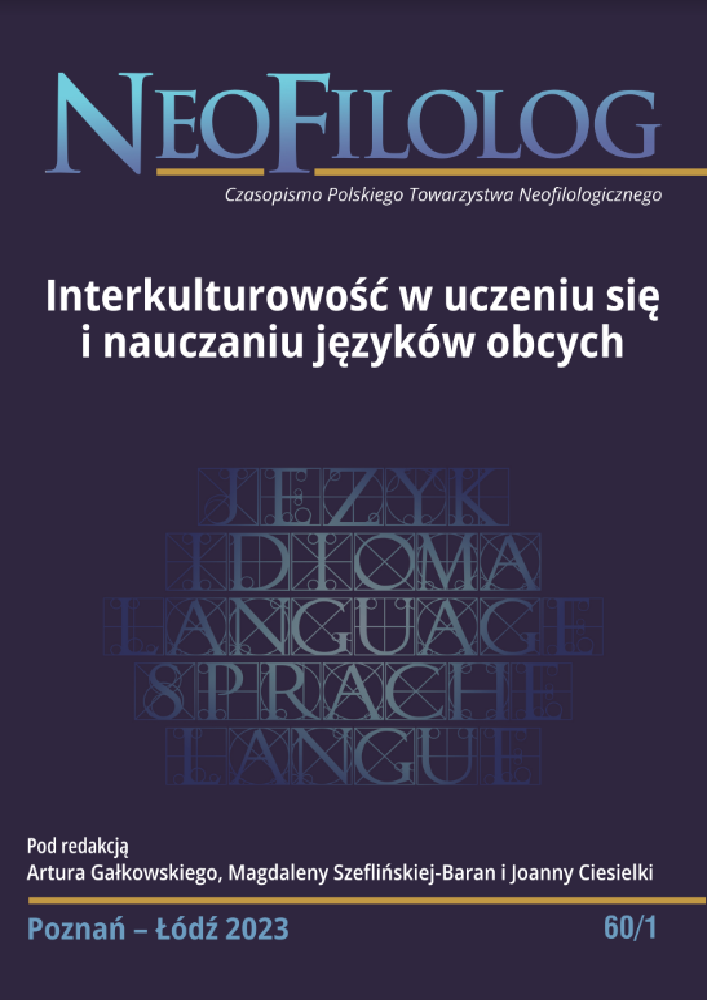Abstrakt
The aim of the text is to describe the didactic discourse in bilingual education i.e. the actions taken by the teacher in biology and chemistry lessons in relation to the terms the student needs to know and assimilate. The description is based on transcriptions of audio recordings of lessons recorded in one of the bilingual high schools in Warsaw. Basing on selected excerpts from the collected corpus, the author i) shows examples of biology and chemistry terms having different forms in Polish and French and ii) defines the teacher's didactic activities, thanks to which the latter helps the students to properly understand and assimilate the elements of field terminology.
Bibliografia
Coyle D., Hood P., Marsh D. (2010). CLIL: Content and Language Integrated Learning. Cambridge: CUP. DOI: https://doi.org/10.1017/9781009024549
Dalton-Puffer C. (2011), Content and Language Integrated Learning: From Practice to Principles? “Annual Review of Applied Linguistics”, 31, s. 182-204. DOI: https://doi.org/10.1017/S0267190511000092
Dijk van T. (2001), Badania nad dyskursem, (w:) Dijk van T. (red.), Dyskurs jako struktura i proces. Warszawa: Wydawnictwo PWN, s. 9-44.
Eurydice 2006. L’enseignement d’une matière intégrée à une langue étrangère (EMILE) à l’école en Europe. Bruxelles.
Garcia O., Baetens Beardsmore H. (2009), Bilingual Education in the 21st Century: a Global Perspective. Oxford: Wiley-Blackwell Pub.
Grucza F. (1997), Języki ludzkie a wyrażenia językowe, wiedza a informacja, mózg a umysł ludzki, (w:) Dakowska M., Grucza F. (red.), Podejście kognitywne w lingwistyce, translatoryce i glottodydaktyce. Warszawa: Wydawnictwa UW, s. 7-19.
Grzmil-Tylutki H. (2010), Francuska lingwistyczna teoria dyskursu Historia Tendencje Perspektywy. Kraków: Universitas.
Iluk J. (2000), Nauczanie bilingwalne. Modele, koncepcje, założenia metodyczne. Katowice: Wydawnictwo UŚ.
Janowska I., Plak M. (2021), Działania mediacyjne w uczeniu się i nauczaniu języków obcych Od teorii do praktyki. Kraków: Księgarnia Akademicka. DOI: https://doi.org/10.12797/9788381386807
Marsh D. (2002), CLIL/EMILE – The European Dimensions: Actions, Trends & Foresight Potential. Brussels: European Commission.
Maljers A., Marsh D., Coyle D., Hartiala A.K., Marsland B., Perez-Vidal C., Wolff D. (2002), CLIL/EMILE The European Dimensions – Actions, Trends and Foresight Potential. Jyväskylä: University of Jyväskylä.
Muszyńska B., Papaja K. (2019), Zintegrowane kształcenie przedmiotowo-językowe Content and language integrated learning (CLIL) Wprowadzenie. Warszawa: Wydawnictwo naukowe PWN.
Nocoń J. (2011), Stylistyczne aspekty dyskursu edukacyjnego, (w:) Sokólska U. (red.), Odmiany stylowe polszczyzny – dawniej i dziś. Białystok: Wydawnictwo Uniwersytetu w Białymstoku, s. 187- 200.
Olpińska-Szkiełko M. (2008), Nauczanie dwujęzyczne w świetle badań i koncepcji glottodydaktycznych. Warszawa: Euroedukacja.
Rada Europy (2022), Cadre Européen Commun de référence pour les langues : Apprendre, Enseigner, Évaluer. Volume complémentaire avec de nouveaux descripteurs, online: https://rm.coe.int/cecr-volume-complementaire-avec-de-nouveaux-descripteurs/16807875d5 [DW 02.01.2023].
Skudrzyk A., Warchała J. (2002), Dyskurs edukacyjny a kompetencja interakcyjna, (w:) Porayski-Pomsta J. (red.), Czynności tworzenia i rozumienia wypowiedzi. Studia Pragmalingwistyczne. Warszawa, s. 277-284.
Sowa M., Kic-Drgas J. (2021), La médiation au service de la construction du sens dans l’enseignement d’une matière par l’intégration d’une langue étrangère. « XLinguae », 4, s. 264-281. DOI : 10.18355/XL.2021.14.04.18. Online: http://www.xlinguae.eu/2021_14_4_18.html [DW 29.09.2022]. DOI: https://doi.org/10.18355/XL.2021.14.04.18
Vignaux G. (1988), Le discours, acteur du monde (Enonciation, argumentation et cognition). Paris: Orphys.
Wolff D. (2003), Content and language integrated learning: a framework for the development of learner autonomy, (w:) Little D., Ridley J. Ushioda E. (red.), Learner Autonomy in the Foreign Language Classroom: Teacher, Learner Curriculum and Assessment. Dublin: Authentik, s. 211-222.
Wolff D. (2014), Tworzenie curriculum i kształcenie nauczycieli w dwujęzycznym nauczaniu przedmiotów niejęzykowych, (w:) Dakowska M., Olpińska-Szkiełko M. (red.), Edukacja dwujęzyczna w przedszkolu i szkole. Warszawa: Wydawnictwo IKL@, s. 95-115.
Licencja
Prawa autorskie (c) 2023 Magdalena Sowa

Utwór dostępny jest na licencji Creative Commons Uznanie autorstwa – Bez utworów zależnych 4.0 Międzynarodowe.
Przedstawiany utwór (artykuł) upubliczniany jest na podstawie umowy z autorem i na licencji Creative Commons Attribution-NoDerivatives 4.0 International (CC BY-ND 4.0).
Użytkownicy mają obowiązek podania wraz z rozpowszechnionym utworem, informacji o autorstwie, tytule, źródle (odnośniki do oryginalnego utworu, DOI) oraz samej licencji;
- bez tworzenia utworów zależnych,
- utwór musi być zachowany w oryginalnej postaci.
Uniwersytet im. Adama Mickiewicza w Poznaniu zachowuje prawo do czasopisma jako całości (układ, forma graficzna, tytuł, projekt okładki, logo itp.).

